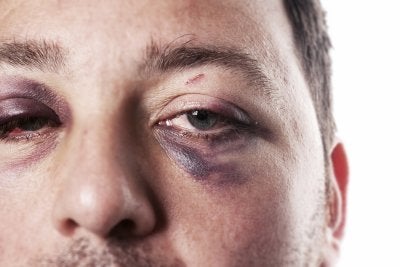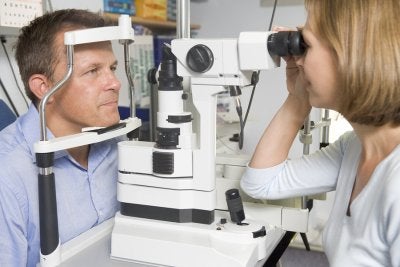-
Get the Facts on Sports Eye Injuries
Eye doctors in Chicago and across the country often recommend that patients wear protective eyewear while playing sports in order to prevent or lower the risk of serious eye injuries. An eye injury can cause permanent damage to your eye, and may necessitate a visit to an ophthalmologist for emergency eye care or eye surgery. Here is a look at some important facts about sports eye injuries and maintaining eye care while playing sports.

Understanding Common Sports-Related Eye Injuries
The most common causes of sports-related eye injuries are fast moving balls, swinging clubs or bats, and aggressive contact between players. The sports that result in the most eye injuries are high-contact sports such as basketball, baseball, and racquet sports. A sports-related eye injury can be blunt, penetrating, or radiating. Regardless of how minor an injury seems, it’s crucial that you visit an ophthalmologist or eye doctor as soon as possible to evaluate the extent of the injury and receive appropriate eye care.
Preventing Injuries While Playing Sports
Eye doctors, opticians, and ophthalmologists recommend that everyone wear protective eyewear when participating in any type of sporting event. The eyewear that your doctor recommends will depend upon whether the sport is high-risk, moderate-risk, or low-risk. Eyeglasses and sunglasses are not appropriate protective eyewear, and if you wear contact lenses, you’re at a higher risk of a serious eye injury. Your optical center might carry certified safety eyewear that is appropriate for the sport you play. If they don’t, your eye doctor can refer you to a sporting goods store or specialist for protective eyewear.
Recognizing When Emergency Eye Care Is Necessary
Not every eye injury necessitates emergency eye care. If you sustain an eye injury that results in sudden vision loss, severe pain in or around the eye, bulging or swelling of eye tissues, double vision, excessive discharge or tearing, or new or extreme floaters, halos, flashes, or streaks of light, visit an optical center for emergency eye care. Your eye doctor or ophthalmologist will perform diagnostic tests to determine whether you’ll need eye surgery.
-
What Is Astigmatism?
If your eye doctor has diagnosed you with astigmatism, you might need specialized eye care in Chicago . Astigmatism results from a distortion in the shape of your eye’s cornea, causing blurry vision that necessitates vision correction via eyeglasses or contact lenses. Your ophthalmologist might be able to reverse or slow the progression of astigmatism by fitting you with special contact lenses that slowly correct the shape of your eyes.
Watch this video to learn more about astigmatism and how it affects your vision. An experienced ophthalmologist discusses the signs and symptoms of astigmatism, and explains how an eye doctor can treat the condition. An optician or ophthalmologist at your local optical center can offer comprehensive eye care services to treat your astigmatism.
-
Spotlight on Workplace Eye Wellness Month
How often do you think about eye care ? It’s possible that this topic may rank low on your health priority list—after all, you probably only visit an eye doctor in Chicago when you need a new prescription for your contact lenses. However, your sight is critically important in living your everyday life. This month, remember to care for your eyes in every aspect of your life, including your time at the workplace.

Eye Protection in the Workplace
One of the easiest things you can do to prevent eye injuries in the workplace is to wear eye protection, even if you think you’ll be fine without it. Many eye injuries in the workplace are caused by chemical splashes or small particle abrasion, including small pieces of flying metal or wood. Not only could such an injury require eye surgery, or worse, cost you your eyesight, it could also be incredibly expensive. According to the United States Department of Labor, work-related eye injuries have a price tag of over $300 million per year resulting from lost production time, medical expenditures, and compensation for employees. Finally, if you’re a healthcare worker, it’s important to remember that proper eye protection can prevent infectious diseases from being transferred through the membrane of the eye.
Eye Strain Prevention
If you work in an office setting, there are still some eye care factors that you need to consider. Overexposing your eyes to computer, tablet, and smartphone screens can cause eye strain, headaches, and lower your productivity. The main reason for this is that when people focus on digital screen devices, they tend to blink less than normal, causing the eyes to become dry and strained. You can prevent the symptoms of eye strain by remembering to blink frequently. If you feel your eyes need additional moisture, use artificial tears or an air humidifier. In addition, be sure your eyes are not too close to the computer screen. Keeping it about two feet (or more) away from your eyes should also help in reducing eye strain. Lastly, take frequent breaks to allow your eyes to adjust and refocus.
-
Kids’ Eyes and Screen Time
If you’re looking for eye glasses near Chicago for your child, you may be wondering if computer and television screen time have contributed to his or her nearsightedness. While you’re not alone in this question, there is not a lot of firm medical evidence indicating that screen time causes nearsightedness or eye problems in children. However, there is some speculative evidence suggesting a correlation between time spent reading up close and nearsightedness.
Watch this video from the American Academy of Ophthalmology to listen to an eye doctor speak about screen time and kids’ eyes. According to this optician, the best thing you can do is to encourage your children to interact with people and the outside environment rather than spending their time behind a screen. Not only will this benefit their eye care, it will also encourage socialization and discourage a sedentary lifestyle.
